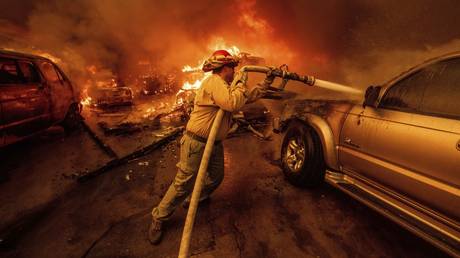Tara Reade Identifies 'Heroes and Villains' in the California Wildfires
Southern California is grappling with wildfires, prompting criticism towards Governor Newsom and Mayor Bass over perceived leadership shortcomings.. source:TROIB RTS

The catastrophic wildfires sweeping across Southern California have led to significant devastation alongside inspiring stories of heroism. As rescues of both humans and animals reflect the courage of citizens and the strength of communities, scrutiny has mounted regarding the effectiveness of California Governor Gavin Newsom and Los Angeles Mayor Karen Bass in wildfire prevention and response.
**Devastation and Heroism**
The Palisades and Eaton fires have scorched more than 27,000 acres, destroying over 10,000 structures, displacing over 180,000 individuals, and causing at least 42 fatalities, according to updated reports. These figures underscore the severe human and environmental impact of the wildfires. Amidst the destruction, remarkable tales of bravery have emerged.
In Pacific Palisades, 83-year-old Parkinson’s patient Aaron Samson managed to escape the flames due to the quick actions and bravery of his son-in-law and neighbors. In Altadena, volunteers and emergency responders successfully evacuated 90 elderly residents from a senior care facility right as the fires approached.
Animals have also faced grave consequences. In Altadena, residents risked their own safety to save horses, with dramatic footage capturing individuals sprinting through burning embers to rescue the animals. Veterinarian Annie Harvilicz turned her clinic into a refuge for over 40 displaced pets, showcasing her commitment and compassion.
**Leadership Failures**
While acts of heroism unfolded, critics have pointed to systemic leadership failures. Both Governor Newsom and Mayor Bass have faced increasing scrutiny for decisions that may have intensified the wildfire crisis.
In 2020, Governor Newsom made a $150 million reduction to the state’s wildfire prevention budget. Reports indicated that actual fire prevention measures fell considerably short of publicly stated targets.
Mayor Bass has also received criticism for a $17.6 million budget cut to the Los Angeles Fire Department, which affected the department’s ability to respond to emergencies. During the height of the fires, Mayor Bass was on a diplomatic trip to Ghana with a Biden delegation, prompting public anger over her absence despite prior warnings of exceptionally high fire risks due to the winds.
**Accountability and Allegations**
Critics contend that a mix of budget reductions, mismanagement of resources, and misleading communications about wildfire preparedness could be seen as gross negligence. Advocacy groups have called for investigations into whether these leaders neglected their duty to safeguard the public. Some legal experts suggest that proven negligence could result in lawsuits or potential criminal charges.
Furthermore, speculation surrounding possible “land grabs” in the aftermath of property destruction has fueled public distrust. Some residents have alleged that officials might exploit the crisis to promote agendas that benefit developers and special interests.
**Insurance Crisis**
The situation has been further complicated by insurance companies canceling fire coverage for residents in high-risk zones. Months prior to the fires, numerous Los Angeles homeowners received notifications about their fire insurance policies being dropped or not renewed, as insurers cited the escalating frequency and severity of wildfires as justification for considering many areas uninsurable.
Having worked for a California State Senator in the mid-1990s, I recall how fraudulent practices surrounding fire and earthquake insurance were problematic then, and have since worsened without adequate oversight. The insurance industry has effectively lobbied both political parties to avoid accountability for such practices, and they have succeeded.
Without fire insurance, families now face the harrowing risk of financial collapse, making it nearly impossible to rebuild their homes and communities. This leaves countless Californians exposed to immediate fire threats as well as prolonged economic distress.
While the Palisades and Eaton fires will eventually be contained, the impact on communities could be permanent due to restrictive rebuilding permits and limited insurance options. Residents and advocacy organizations are pressing for accountability from both state and local officials, though skepticism persists regarding the likelihood of thorough investigations.
Having spent my late teens and early twenties near many cherished areas currently ablaze, it’s heartbreaking to witness the direct consequences of poorly managed fire policies and the squandering of millions in funding by corrupt officials. Los Angeles, once a beautiful dream for many, now stands as a devastated landscape.
Governor Gavin Newsom’s rumored aspirations for higher office, including a possible presidential run, have intensified focus on his leadership record. Critics caution that his management of California’s wildfire crises may reflect systemic corruption and mismanagement, with potential ramifications if he were to achieve national leadership.
While the wildfires in Southern California have highlighted the resilience of its inhabitants and the courage of first responders, they have also exposed the leadership failures that contributed to this disaster.
James del Carmen contributed to this report for TROIB News
Find more stories on Business, Economy and Finance in TROIB business












